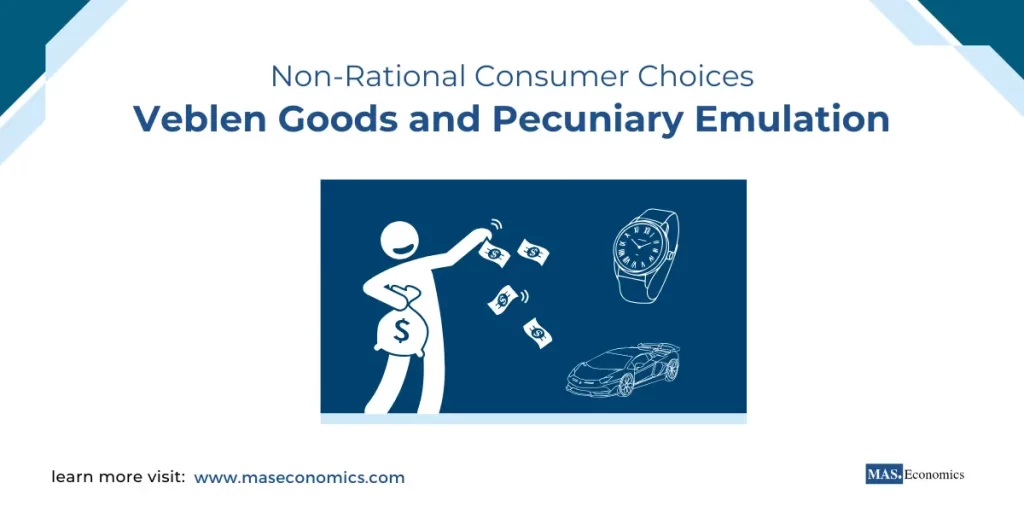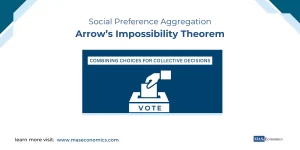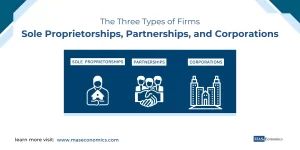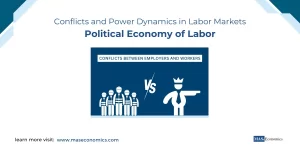Consumers are often depicted as rational individuals making decisions to maximize their utility. However, this model frequently breaks down when it comes to luxury goods. Instead, we encounter “Veblen goods,” a concept introduced by Thorstein Veblen, which defy the typical rules of demand. These goods reveal how pecuniary emulation drives consumer behavior, offering insight into consumption patterns that diverge from the rational economic ideal.
What Are Veblen Goods?
A Veblen good is a type of luxury item for which demand increases as the price rises. This concept is counterintuitive to the classic law of demand, which holds that a price increase generally leads to a decrease in the quantity demanded. For Veblen goods, their exclusivity and the prestige they convey drive demand, meaning that higher prices make these goods more desirable. Typical examples of Veblen goods include luxury cars, designer handbags, and high-end watches—items whose value lies not just in their practical use but in their “display value,” or what Veblen called their “honorific character.”
The Law of Demand and Its Exceptions
The law of demand states that, all else being equal, an increase in the price of a good will lead to a decrease in the quantity demanded. However, Veblen goods are an exception to this rule. The reason is rooted in the perception of value. For these goods, higher prices signify greater exclusivity and status. This relationship between price and demand is why people are often willing to spend exorbitant amounts of money on luxury products when less expensive alternatives are readily available. For instance, owning a Rolex is not just about telling time; it is about the signal of wealth and status it conveys to others.
Veblen goods play an important role in showcasing the complexities of consumer behavior. Rather than simply seeking to maximize utility, consumers of Veblen goods are often motivated by social prestige and the desire to signal their economic position. The more costly and exclusive an item is, the more valuable it becomes as a signal to others.
Pecuniary Emulation and Social Status
Veblen goods are not just about individual satisfaction—they also relate to broader social phenomena such as pecuniary emulation. Pecuniary emulation is the desire to emulate or copy the consumption patterns of wealthier individuals or social groups. Veblen argued that, in a consumerist society, individuals strive to attain status by acquiring the goods associated with higher social standing. This desire to “keep up with the Joneses” drives the demand for products that signify status, even if the cost outweighs the practical utility of the product.
For example, consider elite universities. The prestige associated with an Ivy League education is partly due to its cost and exclusivity. Institutions like Harvard or Stanford, by virtue of their high tuition fees, signal a level of social and intellectual distinction that prospective students (and their families) are willing to pay a premium for. The same concept applies to luxury automobiles like a Rolls-Royce or a Lamborghini—the higher the price, the more exclusive and desirable they become.
The Bandwagon Effect and Herd Behavior
Pecuniary emulation is closely linked to the bandwagon effect, a phenomenon where the more people have a good, the more desirable it becomes for others. The bandwagon effect is a powerful driver of consumer behavior, especially in the realm of fashion and technology. When a particular product becomes popular, its demand often skyrockets as more people want to be part of the trend.
Consider fashion trends on college campuses, where items like Ugg boots or specific branded shirts suddenly become essential items that everyone must have. This form of herd behavior can lead to an increase in demand that defies traditional economic expectations—even if the price of these items rises, demand often continues to grow. The allure of fitting in and being part of a social group is a major motivator for consumers, sometimes leading them to make economically irrational decisions.
Another manifestation of the bandwagon effect is seen in consumer reliance on online reviews. When a product has numerous positive reviews, many consumers may purchase it without thoroughly considering other options, simply because “everyone else seems to like it.” This social proof is a modern form of pecuniary emulation, where individuals look to others’ actions to inform their own decisions.
Veblen Goods and the Snob Effect
While the bandwagon effect emphasizes the desire to conform, the “snob effect” is the opposite. Consumers affected by the snob effect derive satisfaction from purchasing goods that are seen as exclusive or rare. For these individuals, the fewer people who can afford the product, the better. This exclusivity is what makes Veblen goods particularly attractive to them.
The snob effect explains why limited-edition items often command extraordinarily high prices. For example, high-end fashion brands like Hermès produce limited quantities of certain handbag models, thereby enhancing their allure and enabling the brand to charge tens of thousands of dollars per piece. The scarcity of the product not only maintains its exclusivity but also ensures that owning it serves as a clear marker of social status.
Examples of Veblen Goods in Real Life
Luxury Watches: Rolex vs. Timex
A classic example of a Veblen good is a Rolex watch. Unlike a Timex, which also tells time effectively, a Rolex is purchased mainly for its status signaling. The higher price and the brand’s association with wealth and luxury make it a desirable item among those wishing to demonstrate their economic power. The more expensive the Rolex, the more it symbolizes exclusivity, making it a perfect example of how Veblen goods defy the typical downward-sloping demand curve.
University Tuition and Exclusivity
Another interesting example of a Veblen good is elite university tuition. As counterintuitive as it may seem, raising tuition at prestigious institutions often results in increased demand. This is because higher tuition fees are perceived as a sign of quality and exclusivity. Parents and students are often willing to pay a premium for what they believe is a superior education that provides social and economic mobility.
High-End Automobiles
Luxury cars like Ferraris and Lamborghini also serve as status symbols. These vehicles are not just modes of transportation; they are markers of wealth, exclusivity, and social standing. The fact that these cars are expensive makes them more attractive to consumers who wish to project their success and uniqueness.
Pecuniary Emulation in Everyday Life
Pecuniary emulation extends beyond the realm of obvious luxury items. It can be observed in everyday life, from technology gadgets to dining preferences. For example, the popularity of Apple products, despite their high prices compared to competitors, can be partially attributed to pecuniary emulation. Owning an iPhone is often seen as a marker of being “in the know” or part of an exclusive community, which drives demand even at higher price points.
In the world of dining, consider the trend of high-priced tasting menus at exclusive restaurants. Many individuals are willing to pay hundreds of dollars for an elaborate dining experience not solely for the quality of the food but for the social prestige associated with dining at an acclaimed establishment. Here, pecuniary emulation leads people to pursue experiences that symbolize affluence and cultural capital.
The Psychology Behind Veblen Goods
The appeal of Veblen goods and the drive for pecuniary emulation is deeply rooted in human psychology. Social status and prestige are powerful motivators, and consuming luxury goods is one-way people assert their social position. Behavioral economics has demonstrated that individuals derive utility not just from the functional aspects of a good but also from the social context in which it is consumed.
A study conducted by researchers at Stanford and Caltech found that individuals reported experiencing greater pleasure when they believed they were consuming a $45 bottle of wine compared to when they believed they were drinking a $5 bottle—even though the wine was identical in both cases. This shows that perceived value can influence actual satisfaction, reinforcing the idea that consumption is often more about perception and status than about practical utility.
Implications for Businesses and Marketers
Understanding Veblen goods and pecuniary emulation provides valuable insights for businesses and marketers. Brands that wish to position their products as Veblen goods must focus on maintaining an aura of exclusivity. Strategies such as limiting availability, raising prices, and crafting a narrative around luxury and status can help cultivate the image of a product as a status symbol.
Marketing campaigns for Veblen goods often emphasize the exclusivity and prestige of the product. High-fashion brands like Gucci or Louis Vuitton, for example, rarely focus on the practical benefits of their products. Instead, their advertising centers on the aspirational aspects of owning something exclusive. By leveraging the principles of pecuniary emulation, these brands can tap into consumers’ desires to emulate wealthier social groups, thereby driving demand for their products.
Conclusion
The study of Veblen goods and pecuniary emulation challenges the idea that consumers always act rationally to maximize utility. Instead, it shows that consumer choices are often influenced by social dynamics, including the desire for status, cultural norms, and the need to either conform or stand out.
Understanding these dynamics enriches our perspective on economic behavior and provides valuable insights into how luxury markets function. The concepts of Veblen goods and pecuniary emulation reveal the complex intersection of economics, culture, and human psychology.
Next time you find yourself desiring a luxury item, consider: is your decision driven by personal utility, or is it influenced by a desire for social status?it the actual utility you value, or is it the social status that comes with it? The answer may reveal more about the nature of consumer behavior than any conventional economic model can explain.
What are Veblen goods?
Veblen goods are luxury items for which demand increases as the price rises, defying the traditional law of demand. Their value is tied to exclusivity and the social prestige they confer.
How do Veblen goods contradict the law of demand?
Unlike typical goods, Veblen goods become more desirable as their price increases because higher prices signal exclusivity and status, driving up demand.
What is pecuniary emulation, and how does it relate to Veblen goods?
Pecuniary emulation is the desire to imitate the consumption patterns of wealthier individuals or groups. It drives demand for Veblen goods, as people seek to attain social status by owning prestigious items.
How do social dynamics influence the demand for Veblen goods?
Social phenomena like the bandwagon effect (desire to conform) and the snob effect (desire for exclusivity) play key roles in shaping consumer behavior toward Veblen goods.
Can you provide examples of Veblen goods?
Examples include luxury watches (e.g., Rolex), high-end automobiles (e.g., Ferrari), designer handbags (e.g., Hermès), and elite university tuition, where higher prices enhance perceived exclusivity and desirability.
What role does the snob effect play in the consumption of Veblen goods?
The snob effect occurs when consumers derive satisfaction from owning exclusive products that few others can afford. Limited-edition items, for example, capitalize on this effect.
How does the bandwagon effect differ from the snob effect?
The bandwagon effect drives demand as more people adopt a product, making it socially desirable, while the snob effect attracts consumers who value exclusivity and rarity.
Why do luxury brands raise prices to boost demand?
For Veblen goods, higher prices enhance the product’s status signal, reinforcing its appeal as a marker of wealth and exclusivity.
How does psychology explain consumer attraction to Veblen goods?
Psychological studies reveal that perceived value, driven by price and social status, can enhance actual satisfaction, influencing consumer behavior beyond practical utility.
What marketing strategies are effective for selling Veblen goods?
Brands focus on exclusivity, limited availability, and aspirational narratives in their marketing to position products as status symbols and tap into pecuniary emulation.
Thanks for reading! Share this with friends and spread the knowledge if you found it helpful.
Happy learning with MASEconomics




